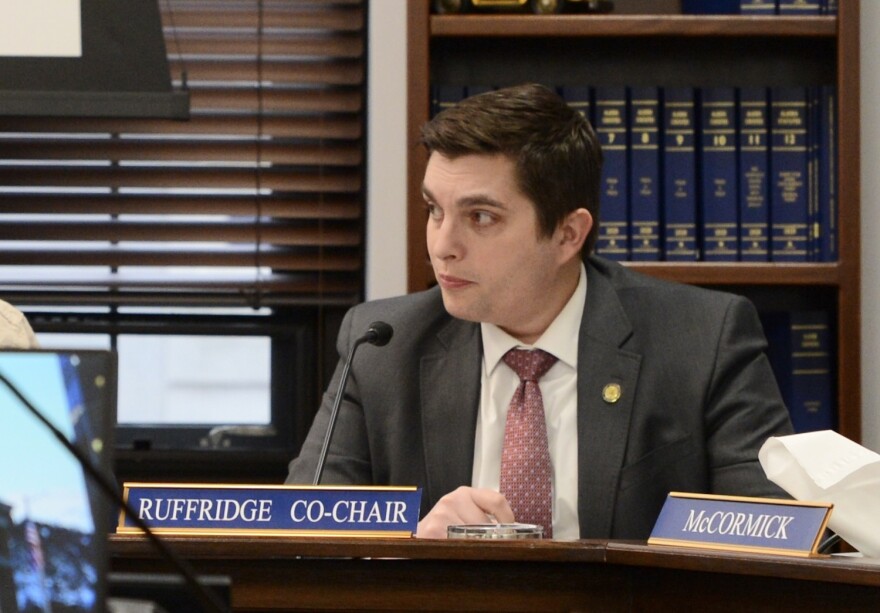Parents of Alaska public school students would be required to OK every lesson taught by their child’s teacher under newly revised legislation approved Wednesday by the House Education Committee.
Without permission, the student would be held out of field trips, extracurricular activities, and even basic lessons on algebra, biology and history.
The revised bill also requires school districts to make single-person restrooms available to students.
A prior version, proposed by Gov. Mike Dunleavy, would have prohibited transgender students from using their preferred bathroom if it didn’t match their “biological sex.” That idea was removed by the committee after hours of public testimony that saw a majority of speakers opposing the idea.
Under the new version, no one would be required to use a particular restroom.
An additional provision in the rewritten bill requires parents to give school districts “a list of all the names and pronouns” that can be used to refer to a student.
This would prevent a transgender student from using a different name without their parent’s knowledge and permission.
The bill is not yet final; it awaits further committee hearings and has yet to pass either the House or Senate.
The new language advanced on a 4-3 vote after committee members amended House Bill 105, which originally stated that parents would have to opt into sex-education classes. The governor’s office labeled the measure a “parental rights” bill, and its details resembled those debated in majority-Republican states across the country.
Rep. Justin Ruffridge, R-Soldotna, revised the bill after consulting with the governor’s office, he said. The revisions followed hours of public testimony, mostly against the original bill.
“I think it was pretty clear from the testimony — especially the testimony that we received in written form — that parents really do want to know, and feel connected to, what their kids are learning at school,” he said.
Given that the governor’s original idea was for “parents rights” legislation, he said, “if we’re going to hear a bill and do work on a bill about parents rights, we should really talk about it in its entirety.”
He envisions parents being presented with a syllabus and being asked to approve it.
“Here’s the plan for the next three or four months, here’s the books we’re going to read and the categories we’re going to discuss. Please let me know if this sounds good to you,” he said, describing a hypothetical process. “And then if there’s any changes to that … a permission slip goes out.”
“It’s just not practical,” said Lon Garrison, director of the Association of Alaska School Boards, which represents local school districts in the Capitol.
He said it would create a huge administrative burden for school administrators and raises questions about what will happen to students whose parents opt them out of lessons.
Then, there’s the practical considerations — requiring parental approval for any changes would prevent teachers from incorporating new material during the school year.
“Right now, the curriculum is approved by the school board; it’s available for everybody to review. But there’s also additional materials that teachers can bring in as long as it’s aligned with the curriculum. And so every time that would happen, theoretically, if you read this bill, you’d have to get permission to do that,” he said.
On the seven-member education committee, four Republicans — Reps. Jamie Allard, R-Eagle River; Mike Prax, R-North Pole; Tom McKay, R-Anchorage; and Ruffridge — voted for the changed bill.
Three non-Republicans — Reps. Andi Story, D-Juneau; Rebecca Himschoot, I-Sitka; and Rep. CJ McCormick, D-Bethel — voted against it.
Allard, co-chair of the education committee, called the bill “much-needed” and said she expects more changes to come when it reaches the judiciary committee.
“Now that it’s moving to Judiciary, it will give us more time to work,” she said.
Prax said he thinks it was a mistake for states to mandate school attendance, a practice that began with Massachusetts in 1853.
“That was the original mistake,” he said in committee, adding afterward that a bill like Wednesday’s proposal helps restore teaching authority to parents, rather than government officials.
“We should have asked ourselves: What crime did parents commit by allowing their children to turn 7, that they have to be sent to school?” Prax said.
McCormick, the youngest member of the Legislature, grew passionate as he spoke against the bill. He graduated from high school in 2015 and said he ran for office to make life easier for kids like him. Wednesday’s bill does the opposite, he said.
“I feel like this bill strips our state’s young people of the ability to make choices for themselves,” he said. “It denies them the ability to live with dignity.”
Correction: The original version of this article incorrectly described the original version of House Bill 105. It would not have required parents to opt students into lessons on dating violence and sexual assault.
Alaska Beacon is part of States Newsroom, a network of news bureaus supported by grants and a coalition of donors as a 501c(3) public charity. Alaska Beacon maintains editorial independence. Contact Editor Andrew Kitchenman for questions: info@alaskabeacon.com. Follow Alaska Beacon on Facebook and Twitter.



